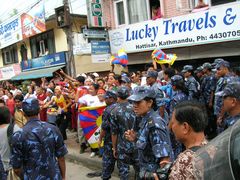In Nepal’s struggle for democracy, journalists and others who work for press freedom face threats that are severe and growing.
The Federation of Nepali Journalists (FNJ) recorded 342 press freedom violations in 2008 alone, highlighting an escalation in the number of physical attacks on journalists and media houses. Four journalists - Uma Singh, J.P. Joshi, Birendra Sah and Pushkar Bahadur Shrestha - have been killed since 2006.
The Comprehensive Peace Agreement between the Government of Nepal and Communist Party of Nepal (Maoist) of 22 November 2006 commits the parties to democratic values, competitive multiparty governance, civil liberties, and human rights, including respect for full press freedom and rule of law. On 1 March 2009, Maoist Chairman and Prime Minister Pushpa Kamal Dahal (Prachanda) reiterated the government’s commitment, though remarked that the recent attacks on journalists and the flourishing culture of impunity were leftovers from the 10 year conflict.
One of the most serious attacks on a media outlet took place on 21 December 2008. A group of around 50 people led by Ramesh Panta, the president of the Maoist -affiliated All Nepal Hotel and Restaurant Workers’ Union (ANHRWU), entered the meeting hall of Himalmedia’s Hattiban office vandalizing the premises and injuring at least 12 senior journalists and other senior-level employees. The union had threatened Himalmedia for allegedly writing against workers in its latest issue. Earlier, they had torched the copies of the news magazine and vandalized the distribution office.
On 23 December, the Maoistaffiliated All Nepal Communications, Printing and Publications Workers Union (ANCPPWU) unit in Biratnagar staged a sit-in at the main entrance of the regional office of Kantipur Publications. Union members prevented distribution of the national issues of the newspaper. The union workers demanded increases in salary as fixed by the government4. On 29 December the government and the FNJ expressed commitment to press freedom and agreed to resolve the problems between the management and the labor union within a week. On the same day, Maoist unionists ended their siege.
The attack on Himalmedia and the siege of the Kantipur office were condemned by several national and international organisations. Jacqueline Park, Director of the International Federation of Journalists (IFJ) Asia-Pacific stated: "This attack on Himalmedia is an attack on press freedom and has nothing to do with the defense of journalism or the public interest."
The brutal murder in January 2009 of Uma Singh7, a 26-year-old woman journalist from Janakpur, raised many questions about the security situation of journalists, especially women, in Nepal. An FNJ fact-finding mission found that journalists in western districts have been working under "psychological terror" due to threats issued by various armed groups and cadres of Unified CPN (Maoist). Women journalists in particular feel insecure and hopeless after the murder of Uma Singh. According to IFJ and FNJ sources, many women are leaving the profession both due to personal fear and in response to family pressure. The majority of women journalists are employed in local radio stations, the media with the largest audience in Nepal. Because of this, radio journalists in general, and women journalists in particular, face the highest threats.
In a press statement, the International Media Mission (IMM) expressed concerns about the attacks on media outlets, about the fact that those responsible are not held accountable and about the vulnerable position of women journalists. The IMM stated that: “as of now, not one person has been convicted for a criminal act against journalists and media outlets, and the IMM calls on the Prime Minister and Government to follow up their commitment to end impunity.”
PBI meets with FNJ regularly to exchange information on the situation of journalists in Nepal. In January PBI Nepal volunteers accompanied a woman journalist9 after she received threats and had to be evacuated to Kathmandu. PBI continues to monitor her security now that she is back in her region. PBI supports journalists who defend human rights through their work and will respond to their requests for accompaniments in the future.

